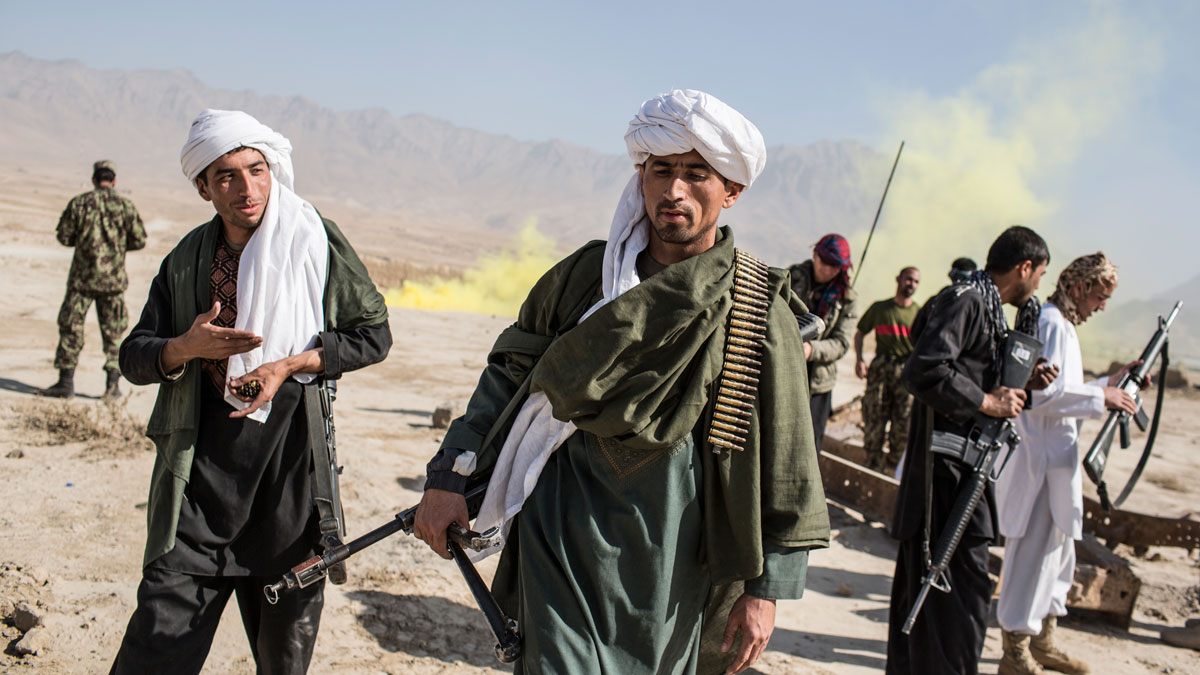Taliban ‘tortured and massacred’ Hazara men
Amnesty International says killings prove minorities are at risk from Afghanistan rulers

A free daily email with the biggest news stories of the day – and the best features from TheWeek.com
You are now subscribed
Your newsletter sign-up was successful
The Taliban recently tortured and killed members of the Hazara ethnic minority in Afghanistan, according to Amnesty International.
“Most of the Hazara are Shi’ite Muslims, whom Sunni hardliners like the Taliban abhor,” Reuters reported. According to the BBC, they have faced “long-term discrimination and persecution” in Afghanistan, where they are the third-largest ethnic group, and Pakistan.
Amnesty said it has received “harrowing” accounts from witnesses, who say the killings took place in July in Ghazni province.
The Week
Escape your echo chamber. Get the facts behind the news, plus analysis from multiple perspectives.

Sign up for The Week's Free Newsletters
From our morning news briefing to a weekly Good News Newsletter, get the best of The Week delivered directly to your inbox.
From our morning news briefing to a weekly Good News Newsletter, get the best of The Week delivered directly to your inbox.
Nine Hazara men reportedly died, six of whom were shot and three tortured to death. One had his arm muscles sliced off and another had his legs and arms broken and his hair pulled out. One of the victim’s chests was reportedly so riddled with bullets that he had to be buried in pieces.
When challenged by onlookers, a Taliban fighter said: “When it is the time of conflict, everyone dies, it doesn’t matter if you have guns or not. It is the time of war.”
Amnesty’s secretary-general, Agnes Callamard, said the “targeted killings” are “proof that ethnic and religious minorities remain at particular risk under Taliban rule in Afghanistan”.
With mobile phone services cut in many of the regions captured by the Taliban, information about the killings last month has not emerged until now. Amnesty has called on the United Nations to investigate and protect those at risk.
A free daily email with the biggest news stories of the day – and the best features from TheWeek.com
According to legend, the Hazara are descendants of Genghis Khan and his soldiers, who invaded Afghanistan in the 13th century.
The news of the attacks comes after several people were killed in the eastern city of Asadabad when Taliban fighters fired on people waving the national flag at a rally.
The New York Times said the rally was “a remarkable display of defiance, coming just a day after violence broke out at protests in two other cities, with Taliban members shooting into crowds and beating demonstrators”.
Meanwhile, Sky News reported that the Taliban has started “rounding up a blacklist of Afghans who worked with the fallen government, or American and British forces, and is threatening them with Sharia punishment”.
Chas Newkey-Burden has been part of The Week Digital team for more than a decade and a journalist for 25 years, starting out on the irreverent football weekly 90 Minutes, before moving to lifestyle magazines Loaded and Attitude. He was a columnist for The Big Issue and landed a world exclusive with David Beckham that became the weekly magazine’s bestselling issue. He now writes regularly for The Guardian, The Telegraph, The Independent, Metro, FourFourTwo and the i new site. He is also the author of a number of non-fiction books.
-
 Why is the Trump administration talking about ‘Western civilization’?
Why is the Trump administration talking about ‘Western civilization’?Talking Points Rubio says Europe, US bonded by religion and ancestry
-
 Quentin Deranque: a student’s death energizes the French far right
Quentin Deranque: a student’s death energizes the French far rightIN THE SPOTLIGHT Reactions to the violent killing of an ultraconservative activist offer a glimpse at the culture wars roiling France ahead of next year’s elections
-
 Secured vs. unsecured loans: how do they differ and which is better?
Secured vs. unsecured loans: how do they differ and which is better?the explainer They are distinguished by the level of risk and the inclusion of collateral
-
 Epstein files topple law CEO, roil UK government
Epstein files topple law CEO, roil UK governmentSpeed Read Peter Mandelson, Britain’s former ambassador to the US, is caught up in the scandal
-
 Iran and US prepare to meet after skirmishes
Iran and US prepare to meet after skirmishesSpeed Read The incident comes amid heightened tensions in the Middle East
-
 Israel retrieves final hostage’s body from Gaza
Israel retrieves final hostage’s body from GazaSpeed Read The 24-year-old police officer was killed during the initial Hamas attack
-
 China’s Xi targets top general in growing purge
China’s Xi targets top general in growing purgeSpeed Read Zhang Youxia is being investigated over ‘grave violations’ of the law
-
 Panama and Canada are negotiating over a crucial copper mine
Panama and Canada are negotiating over a crucial copper mineIn the Spotlight Panama is set to make a final decision on the mine this summer
-
 Why Greenland’s natural resources are nearly impossible to mine
Why Greenland’s natural resources are nearly impossible to mineThe Explainer The country’s natural landscape makes the task extremely difficult
-
 Iran cuts internet as protests escalate
Iran cuts internet as protests escalateSpeed Reada Government buildings across the country have been set on fire
-
 US nabs ‘shadow’ tanker claimed by Russia
US nabs ‘shadow’ tanker claimed by RussiaSpeed Read The ship was one of two vessels seized by the US military